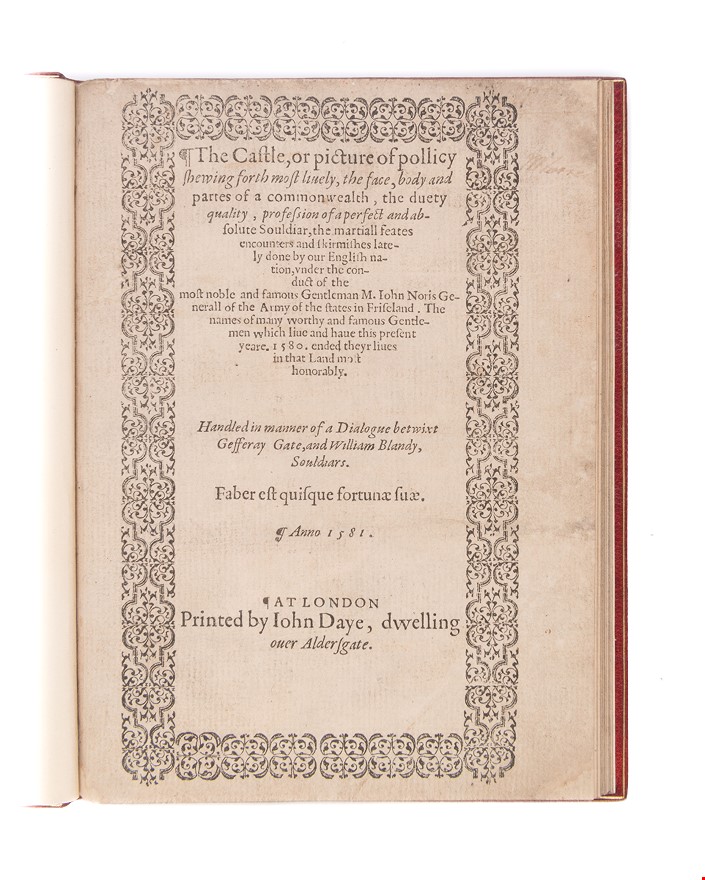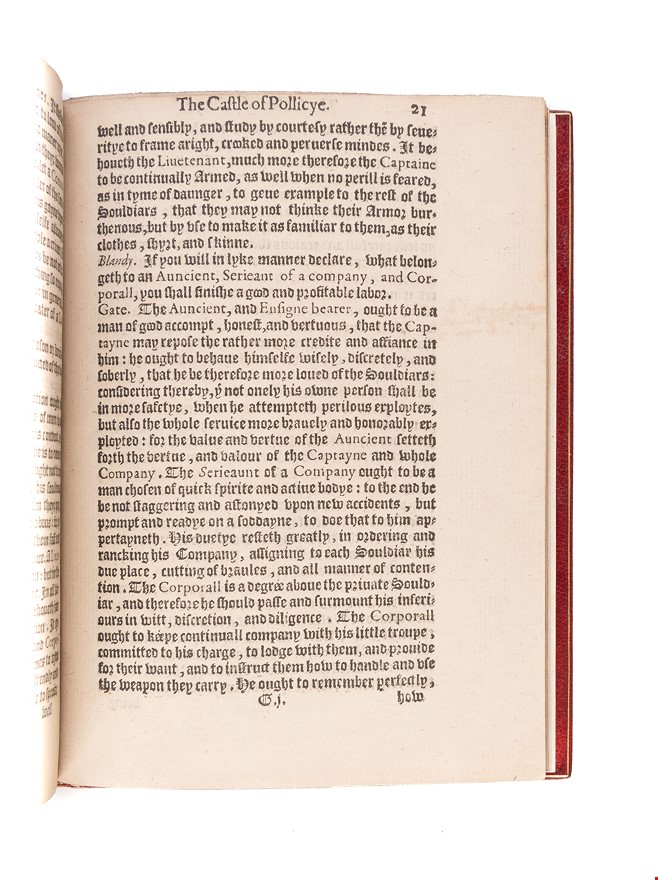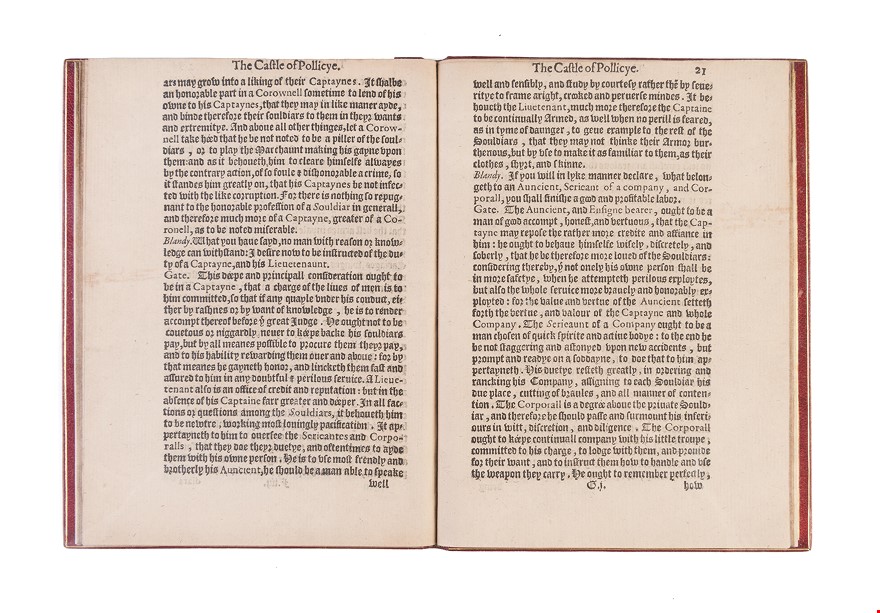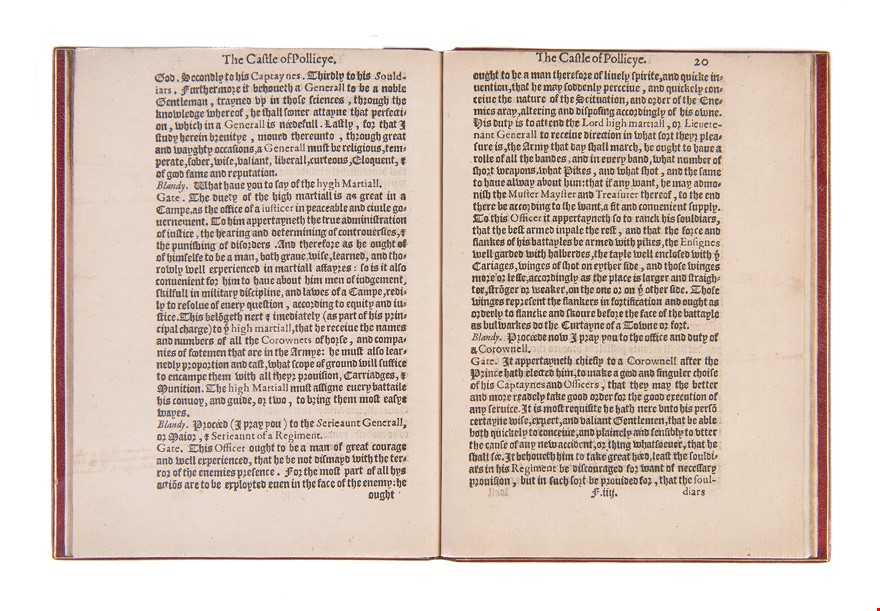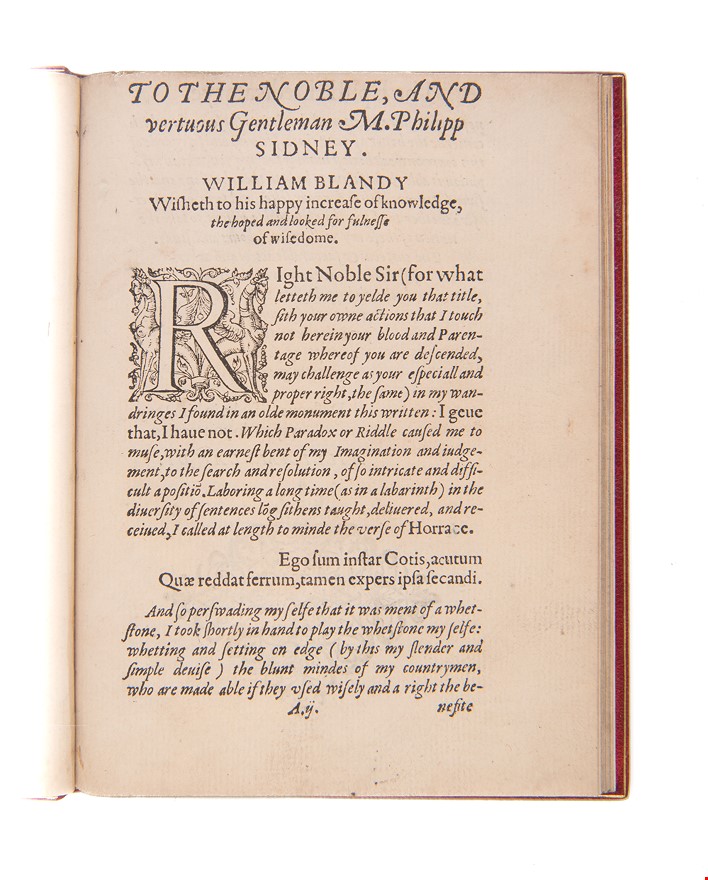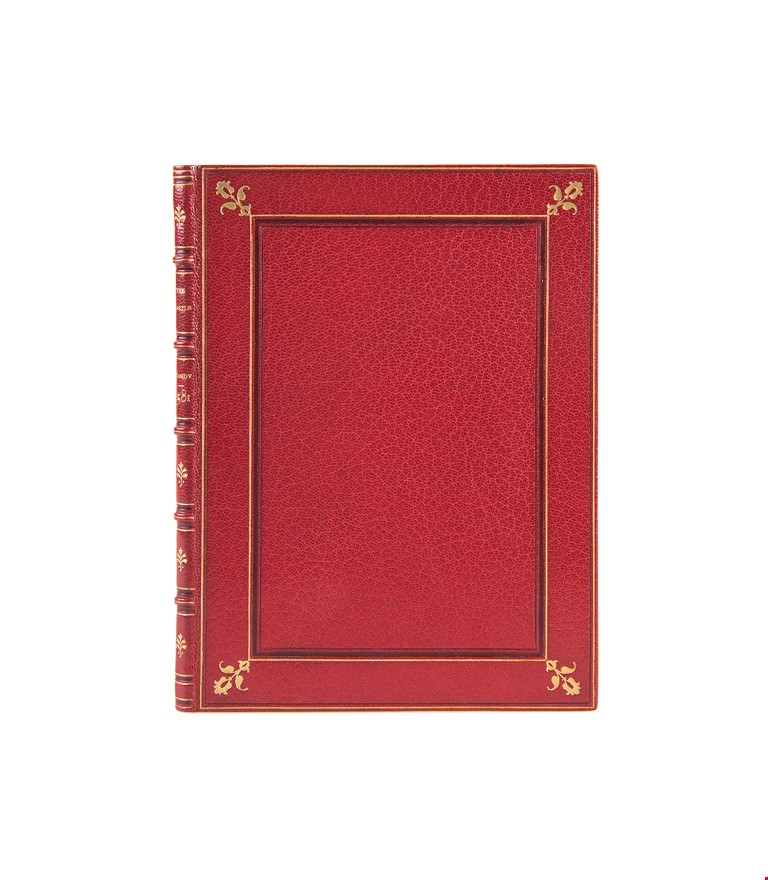The Castle, or picture of pollicy shewing forth most lively, the face, the body and partes of a commonwealth,
BLANDIE or BLANDY William ([1581].)
£18000.00 [First Edition]
Please contact us in advance if you would like to view this book at our Curzon Street shop.
DEDICATED TO SIR PHILIP SIDNEY
the duety quality, profession of a perfect and absolute Souldiar, the martiall seates encounters and skirmishes lately done by our English nation under the conduct of the most noble and famous Gentleman M. John Noris Generall of the Army of the states in Friesland. The names of many worthy and famous Gentlemen which live and have this present yeare. 1580. ended theyr lives in that Land most honorably. Handled in the manner of a Dialogue betwixt Gefferay Gate, and William Blandy Souldiers.
First Edition. Small 4to (175 x 131mm). [4], 30 pp. Black letter; title within a type-ornament border. Carefully washed throughout (obscuring some old annotations [see below], title-page a little dusty, some corners repaired, a few marks in places, closely cropped at the upper edge (occasionally just touching the running-titles in a few places). Full red crushed morocco by Riviere, lettered in gilt to spine.
London: by John Day, [1581]
STC 3128. Very Rare - only one complete copy in the USA. ESTC records BL (x2, one with mutilated title-page, the other cropped at head), Lambeth Palace Library (a ghost - misreported by ESTC), All Souls' College Oxford (defective: lacks the final leaf), Bodley; Folger (defective: lacking A3-4; Pembroke Library copy) and Huntington (ex Herbert - Bright - Miller, bought at the Britwell sale 1924 - reproduced on EEBO - last leaf slightly damaged at the head).
A political discourse on an ideal social polity combined with an account of Sir John Norris / Norreys's valiant action in The Netherlands, dedicated to Sir Philip Sidney.
William Blandy (fl. 1563-1581) was born in Newbury and educated at New College, Oxford (B.A. 1566) but was stripped of his degree in the same year by the Bishop of Winchester on his visitation to the college - "it may be for Popery" wrote William Herbert in his copy of Blandy's translation of Bishop Jeronimo Osorio's De nobilitate christiana (Lisbon, 1542) as Five Bookes ... contayninge a discourse of Civill, and Christian Nobilitie (1576) at Huntington (reproduced on EEBO). After Oxford he was a student at the Middle Temple (1571) and was a member of Lyon's Inn, one of the smallest Inns of Court which numbered Sir Edward Coke and John Selden among its students. His translation of Osorio was dedicated to Robert Dudley, Earl of Leicester, Chancellor of Oxford University. Nothing else is known of him but, from his own testimony here, he was in Friesland, presumably serving as a gentleman volunteer, that is a mercenary, under Sir John Norris or Norreys in the service of the rebellious Dutch States against Spain.
It was in Friesland, where Sir John Norris was colonel-general of States' army, that Blandy says he met "Gefferay Gate", i.e. Geoffrey Gates (fl. 1566-80; see ODNB and The History of Parliament), an experienced gentleman soldier (a nephew of Sir Francis Walsinghamn and probable former MP for three Cornish boroughs) and author of The Defence of militarie profession (1579) - "one of the most remarkable works of its type (ODNB). Gate is his interlocutor in the present book which is formed as a dialogue:
"Being in Friseland it was our happ (if you well remember) wherein you tooke at that tyme no small pleasure, to be ofte rancked together: Where, partely to make our labours more pleasaunt, but chiefely to sift and feele ech others drift, you with many moe of sound and ripe experience, moved questions too and fro of no small importau[n]ce. All which had relation to pollicye, and civile government." (f. 2r).
And, it was on the march together that Blandy formulated the image he presents here, of his "castle" or "pallace" - a round building with six rooms: three circular chambers in the roof and three square rooms below. It was called "Pollicye" and its six inhabitants were: "A King, a Iusticer, A Souldiar, A Marchaunt, An Artificer, A Tiller of the ground." (f. 3v). The strength of the castle lies in the combination of its inhabitants in due and accustomed proportion. From proportion he moves on to the deformed and conformed mind, the original state of Man and the Fall of Adam, the origin of kings and princes in a time of social chaos and the nature of the virtues (prudence and temperance) and strengths (valour and fortitude) to maintain the glory of a "well-governed Commonwealth" (f. 11v). He then moves on to the Justicer and the Soldier as the "two limmes that chiefly and above other, strengthen the body of princely maiestie." (f. 15r).
Blandy firstly characterises and compares the qualities of the Justicer and the Soldier, arguing that the latter deserves the second place in our Commonwealth after the King:
"... the souldier so little estemeth safety at home, content in his mate, pleasure in his children, solace with his friendes, that where his fidelity to his Prince, love to his countrey, honor of his upright minde, shall be brought in question, and stand to be tryed, he will not onely most willingly forgoe all these, but cherefully vow and consecrate his lustye limmes to tiresome labours, his body richly clad, to pinching nakedness, his feeding nature, to starving hunger, his fresh and lively lookes to loathsome languishing; his sinowes to be severed, his joyntes to be cut in two, his bloud to be spilt, his carcase to be stamp to dyrt & myre..." (f. 15v).
He then outlines the qualities of the various different ranks of soldiers before describing the actions of Sir John Norris (c. 1547-1597) and his troops in the Low Countries. Particular praise is given to a Captain Corn, who lost his life in a skirmish at Groningen and whose name allows Blandy to indulge in an extended metaphor:
"This Corne was not great of bodye, a very graine in comparison, yet yelding aboundance of fine and white flower. ... I would her majesty our most gracious Queene and governour had all the empty barnes in England at this present, and voyde houses full of suche Corn, as he was." (f. 23r).
In The Ashgate Research Companion to Popular Culture in Early Modern England, Rory Rapple draws a comparison between this type of battle literature and Thomas Churchyard's "picaresque exploits of individual martial men" in his Churchyardes Chippes and Churchyardes Choise. Rapple makes the point that short (and relatively inexpensive) pamphlet accounts, such as The Castle, would have been more likely to find their way into the hands of returning soldiers (p. 346).
Rapple also notes how The Castle attempts to, "anatomise the command structure of the English forces in the Netherlands" and links it with Thomas Styward's The pathway of martial discipline (published the following year) which also attempted to formalise military chains of command and examined the qualities associated with each rank (p.349).
Finally (f. 27v) Blandy returns to his original subject and discusses the other inhabitants of his "Castle" - the Merchant, the Artificer, and the Tiller of the ground and their positions in society. He dislikes the sons of rich merchants who have inherited their wealth "in the rage and fury of youth, with an earnest purpose and intention to chaunge launes for landes, gummy silcke for a sweet and fat farme" - they "geve theyr Countrye to often most unnaturally a deepe and deadlye wound." (f. 28v). In contrast, artificers and tillers of the ground all contribute according to the level of their skills but he laments the present decayed state of the clothiers' trade.
The book is dedicated to Sir Philip Sidney. Blandy, in his dedication, casts himself as a whetstone sharpening the, "blunt mindes of my countrymen" (Aiir). This sharpness will allow these men "to cut most deeply into those causes which concentrate the honor of our Prince, security and safegarde of this commonwealth". Blandy describes Sidney as both the whetstone and the sharpened sword. The dedication marks an interesting point in Sidney's life as it coincides with his full return to Court from Wilton after working on his Old Arcadia and is long before his short-lived but famous military career began with his appointment as Governor of Flushing in the Autumn of 1586.
While the Castle was widely used in literature as a metaphor in the late Middle Ages and Renaissance (e.g. for the State, the Church, the Body), it is one that particularly appealed to Philip Sidney and not only with reference to the state or polis but also to the household and to female chastity; see Katherine DeZur, Gender, Interpretation, and Political Rule in Sidney's 'Arcadia' (Delaware, 2013), Chapter 3 "Defending the Castle in Sidney's Old Arcadia." However, it is apparent that as he moved from one homosocial setting to another (Oxford, Inns of Court, and the army) there was no place for women in William Blandy's Castle.
Following the dedication (2pp.) is a letter from Blandy to his friend Captain Edward Morris (2pp.) sending a draft of his book for an expert appraisal on the military details and a letter in return from Morris to Blandy (1p.) and a 43-line poem by "Lodowick Flood" beginning, "Might man ascend to see the sunne, to vewe the starres in sky: | No doubt unsweete the sight would be, might he not that discrye." "Lodowick Flood" is presumed to be the Welsh writer and courtier Lodowick [or Ludovic] Lloyd (fl. 1573-1607).
No copy - other than the present - recorded on either ABPC or Rare Book Hub as having sold at auction since the Britwell copy in 1924.
Early Provenance: Two washed and indistinct signatures in the upper fore-corner of the title-page, the first possibly "Far[-]", the second "Morris". There are a number of contemporary ink annotations and underlinings in the text, but they are also very heavily washed but some are just about visible with a UV light (e.g. p. 4 "A definition of proportion", p. 19 "the onlie grace in a soldier" & "the duetie of a gen[eral]", p. 22 "The description of malecontentes", p. 29 "Clothmaking a science") and would benefit from further study.
Later Provenance: Probably the copy sold in a miscellaneous sale, Sotheby, 28-9/7/1904, lot 120 ("morocco extra, g.e. by Riviere"), £7 to Pickering & Chatto, who were the principal agents for: Thomas Francis Fremantle, 3rd Baron Cottesloe (1862-1956), British peer, soldier and sportsman, with his armorial bookplate on the front pastedown. Cottesloe amassed a large collection of military books at his home, Swanbourne House, in Buckinghamshire. The library was sold by his descendants at Sotheby's, 19/11/2019, lot 42.
Stock Code: 234085
